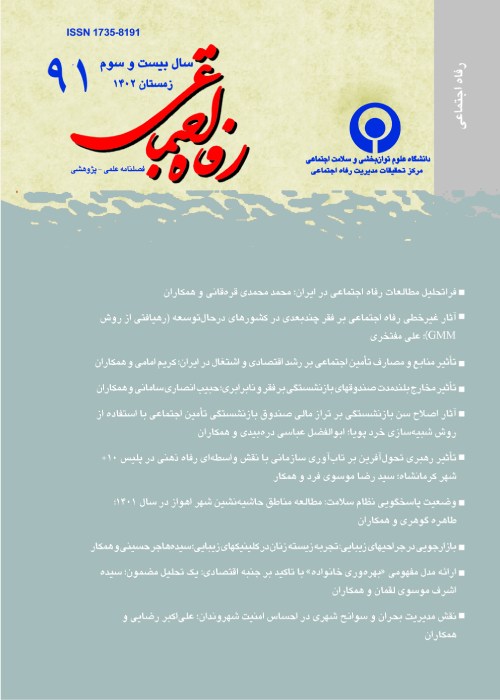Explaining Sense of self-actualization among Student on the basis of perceived social support and social capital
The sense of self-actualization, which is at the highest level in the range of Maslowchr('39')s needs, implies the flourishing of the talents and potential of human beings. The development of self-actualization has positive effects on individuals, especially students. Students with high self-actualization have a high degree of mental health, academic achievement and high. Life satisfaction; therefore, it is important to recognize the factors affecting self-actualization in students. Perceived Social support is one of the factors that appears to be related to sense of self-actualization on students. Perceived social support is a kind of mental judgment in which one thinks that his family and friends will help him when faced with tensions and accidents. The sources of support make the person feel caring, loving, self-esteeming and worthwhile, and can successfully deal with stress factors by being part of a broad network of communication. But in addition to perceived social support, another factor that may be associated with self-actualization is social capital. This concept refers to the links and connections among the members of a network as a valuable resource, which creates norms and mutual trust that accomplish the goals of the members, and with known sociological variables such as trust, awareness, concern about others and public issues, Participation in public affairs, solidarity and group solidarity, and collaboration. Given the importance of perceived social support and social capital variables, the purpose of this study was to explain Sense of self-actualization among Student by perceived social support and social capital.
In a Descriptive-correlational study, from among all students of various schools of Azerbaijan Shahid Madani University, in 2018-2019, 361 students (211 girls and 150 boys) were selected using multistage cluster sampling method and using the margin of error Cochran. The participants completed the Multidimensional Scale of Perceived Social Support, Ahwaz Self – Actualization Inventory and Social capital Inventory. Data analysis was performed using the Pearson correlation coefficient and multiple regression analysis (stepwise).
The results showed that there is a positive and significant relationship between perceived social support components (friends, family and person) with Sense of self-actualization. Also, there was a positive and significant relationship between the components of social capital (trust, networks and common norms, mutual cooperation and cooperation, empathy of understanding and mutual respect, co-operation and voluntary participation, collective identity) with Sense of self-actualization. The positive relationship between perceived social support and social capital with self-actualization means that with increased perceived social support and social capital, self-actualization increases in students, and vice versa. Also, Stepwise regression results showed that from components of perceived social support, important person and friend were able to predict Sense of self-actualization. These results also indicated that from components of social capital, Social solidarity and collective identity were able to predict Sense of self-actualization.
Considering the positive relationship between perceived social support and social capital with Sense of self-actualization among students and predicting Sense of self-actualization.based on these variables, it can be concluded that perceived social support and social capital variables are important factors in explaining studentschr('39') Sense of self-actualization. In line with the results of previous researches, it can be concluded that families and friends are important sources of social support for students, and the quality and quantity of social relationships, social ties or social capital determines the growth and prosperity of students. So neglecting these factors can cost a lot of money for the higher education system. Therefore, by designing practical policies to increase the perceived social protection level, as well as expanding social capital, establishing interpersonal and group relationships, self-awareness and conflict resolution can be significantly affected by the costs and educational costs of the education system it’s great. Therefore, paying more attention to these variables and raising them among students and other groups is essential.
- حق عضویت دریافتی صرف حمایت از نشریات عضو و نگهداری، تکمیل و توسعه مگیران میشود.
- پرداخت حق اشتراک و دانلود مقالات اجازه بازنشر آن در سایر رسانههای چاپی و دیجیتال را به کاربر نمیدهد.



